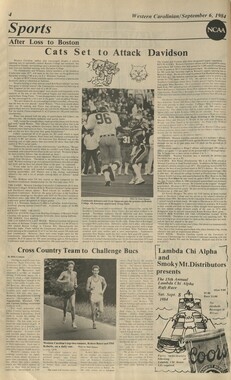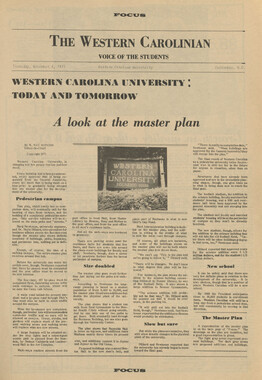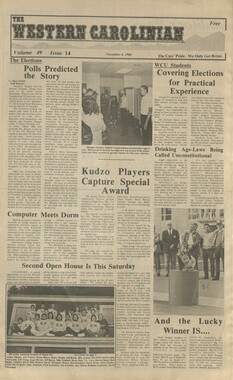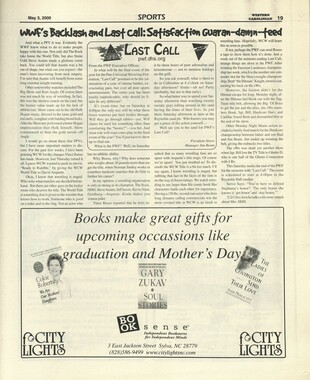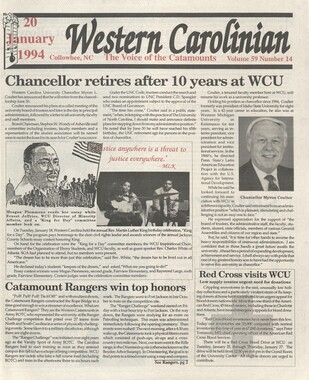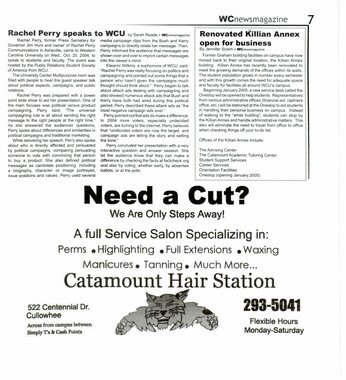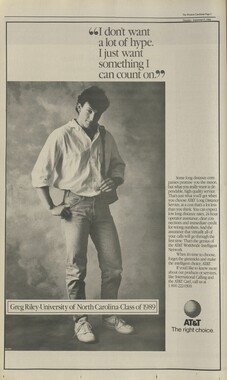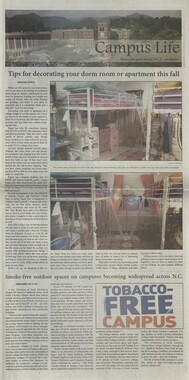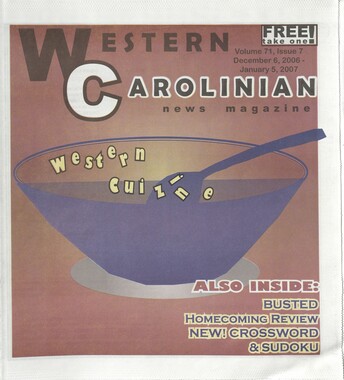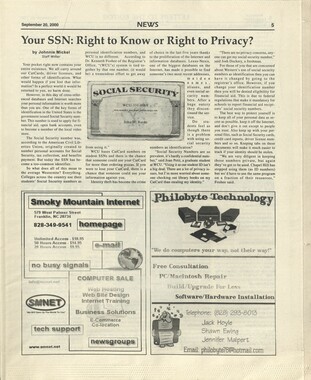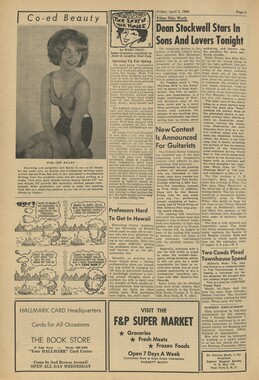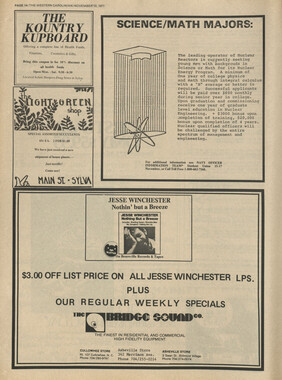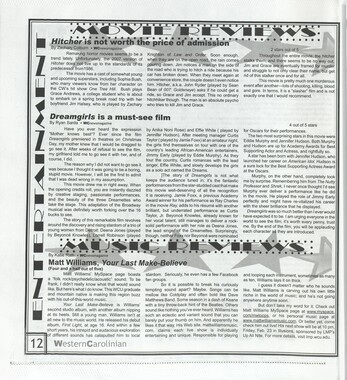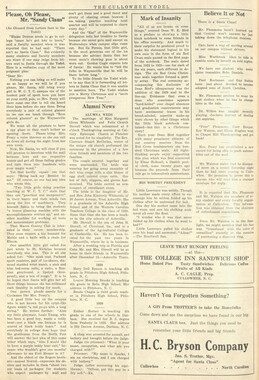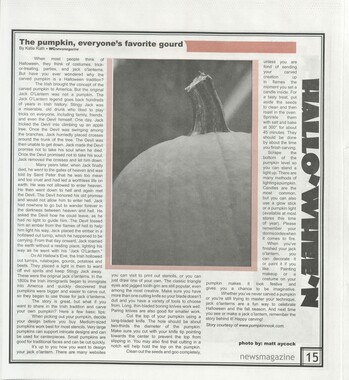Western Carolina University (21)
View all
- Canton Champion Fibre Company (2308)
- Cherokee Traditions (291)
- Civil War in Southern Appalachia (165)
- Craft Revival (1942)
- George Masa Collection (82)
- Great Smoky Mountains - A Park for America (2922)
- Highlights from Western Carolina University (422)
- Horace Kephart (941)
- Journeys Through Jackson (159)
- LGBTQIA+ Archive of Jackson County (85)
- Oral Histories of Western North Carolina (314)
- Picturing Appalachia (6829)
- Stories of Mountain Folk (413)
- Travel Western North Carolina (154)
- Western Carolina University Fine Art Museum Vitreograph Collection (129)
- Western Carolina University Herbarium (92)
- Western Carolina University: Making Memories (738)
- Western Carolina University Publications (2491)
- Western Carolina University Restricted Electronic Theses and Dissertations (146)
- Western North Carolina Regional Maps (71)
- World War II in Southern Appalachia (131)
University of North Carolina Asheville (6)
View all
- Allanstand Cottage Industries (62)
- Appalachian National Park Association (53)
- Bennett, Kelly, 1890-1974 (1463)
- Berry, Walter (76)
- Brasstown Carvers (40)
- Carver, George Washington, 1864?-1943 (26)
- Cathey, Joseph, 1803-1874 (1)
- Champion Fibre Company (233)
- Champion Paper and Fibre Company (297)
- Cherokee Indian Fair Association (16)
- Cherokee Language Program (22)
- Crowe, Amanda (40)
- Edmonston, Thomas Benton, 1842-1907 (7)
- Ensley, A. L. (Abraham Lincoln), 1865-1948 (275)
- Fromer, Irving Rhodes, 1913-1994 (70)
- George Butz (BFS 1907) (46)
- Goodrich, Frances Louisa (120)
- Grant, George Alexander, 1891-1964 (96)
- Heard, Marian Gladys (60)
- Kephart, Calvin, 1883-1969 (15)
- Kephart, Horace, 1862-1931 (313)
- Kephart, Laura, 1862-1954 (39)
- Laney, Gideon Thomas, 1889-1976 (439)
- Masa, George, 1881-1933 (61)
- McElhinney, William Julian, 1896-1953 (44)
- Niggli, Josephina, 1910-1983 (10)
- North Carolina Park Commission (105)
- Osborne, Kezia Stradley (9)
- Owens, Samuel Robert, 1918-1995 (11)
- Penland Weavers and Potters (36)
- Roberts, Vivienne (15)
- Roth, Albert, 1890-1974 (142)
- Schenck, Carl Alwin, 1868-1955 (1)
- Sherrill's Photography Studio (2565)
- Southern Highland Handicraft Guild (127)
- Southern Highlanders, Inc. (71)
- Stalcup, Jesse Bryson (46)
- Stearns, I. K. (213)
- Thompson, James Edward, 1880-1976 (226)
- United States. Indian Arts and Crafts Board (130)
- USFS (683)
- Vance, Zebulon Baird, 1830-1894 (1)
- Weaver, Zebulon, 1872-1948 (58)
- Western Carolina College (230)
- Western Carolina Teachers College (282)
- Western Carolina University (2008)
- Western Carolina University. Mountain Heritage Center (18)
- Whitman, Walt, 1819-1892 (10)
- Wilburn, Hiram Coleman, 1880-1967 (73)
- Williams, Isadora (3)
- Cain, Doreyl Ammons (0)
- Crittenden, Lorraine (0)
- Rhodes, Judy (0)
- Smith, Edward Clark (0)
- Appalachian Region, Southern (2693)
- Asheville (N.C.) (1936)
- Avery County (N.C.) (26)
- Blount County (Tenn.) (195)
- Buncombe County (N.C.) (1672)
- Cherokee County (N.C.) (283)
- Clay County (N.C.) (556)
- Graham County (N.C.) (236)
- Great Smoky Mountains National Park (N.C. and Tenn.) (519)
- Haywood County (N.C.) (3569)
- Henderson County (N.C.) (70)
- Jackson County (N.C.) (4913)
- Knox County (Tenn.) (35)
- Knoxville (Tenn.) (13)
- Lake Santeetlah (N.C.) (10)
- Macon County (N.C.) (420)
- Madison County (N.C.) (215)
- McDowell County (N.C.) (39)
- Mitchell County (N.C.) (132)
- Polk County (N.C.) (35)
- Qualla Boundary (982)
- Rutherford County (N.C.) (76)
- Swain County (N.C.) (2182)
- Transylvania County (N.C.) (270)
- Watauga County (N.C.) (12)
- Waynesville (N.C.) (86)
- Yancey County (N.C.) (72)
- Aerial Photographs (3)
- Aerial Views (60)
- Albums (books) (4)
- Articles (1)
- Artifacts (object Genre) (228)
- Bibliographies (1)
- Biography (general Genre) (2)
- Cards (information Artifacts) (38)
- Clippings (information Artifacts) (191)
- Copybooks (instructional Materials) (3)
- Crafts (art Genres) (622)
- Depictions (visual Works) (21)
- Design Drawings (1)
- Drawings (visual Works) (185)
- Envelopes (73)
- Exhibitions (events) (1)
- Facsimiles (reproductions) (1)
- Fiction (general Genre) (4)
- Financial Records (12)
- Fliers (printed Matter) (67)
- Glass Plate Negatives (381)
- Guidebooks (2)
- Internegatives (10)
- Interviews (815)
- Land Surveys (102)
- Letters (correspondence) (1013)
- Manuscripts (documents) (618)
- Maps (documents) (177)
- Memorandums (25)
- Minutes (administrative Records) (59)
- Negatives (photographs) (6090)
- Newsletters (1290)
- Newspapers (2)
- Notebooks (8)
- Occupation Currency (1)
- Paintings (visual Works) (1)
- Pen And Ink Drawings (1)
- Periodicals (193)
- Personal Narratives (10)
- Photographs (12976)
- Plans (maps) (1)
- Poetry (5)
- Portraits (4568)
- Postcards (329)
- Programs (documents) (181)
- Publications (documents) (2443)
- Questionnaires (65)
- Relief Prints (26)
- Sayings (literary Genre) (1)
- Scrapbooks (282)
- Sheet Music (2)
- Slides (photographs) (402)
- Songs (musical Compositions) (2)
- Sound Recordings (796)
- Specimens (92)
- Speeches (documents) (18)
- Tintypes (photographs) (8)
- Transcripts (322)
- Video Recordings (physical Artifacts) (23)
- Text Messages (0)
- A.L. Ensley Collection (275)
- Appalachian Industrial School Records (7)
- Appalachian National Park Association Records (336)
- Axley-Meroney Collection (2)
- Bayard Wootten Photograph Collection (20)
- Bethel Rural Community Organization Collection (7)
- Blumer Collection (5)
- C.W. Slagle Collection (20)
- Canton Area Historical Museum (2110)
- Carlos C. Campbell Collection (462)
- Cataloochee History Project (64)
- Cherokee Studies Collection (4)
- Daisy Dame Photograph Album (5)
- Daniel Boone VI Collection (1)
- Doris Ulmann Photograph Collection (112)
- Elizabeth H. Lasley Collection (1)
- Elizabeth Woolworth Szold Fleharty Collection (4)
- Frank Fry Collection (95)
- George Masa Collection (173)
- Gideon Laney Collection (452)
- Hazel Scarborough Collection (2)
- Hiram C. Wilburn Papers (28)
- Historic Photographs Collection (236)
- Horace Kephart Collection (861)
- Humbard Collection (33)
- Hunter and Weaver Families Collection (1)
- I. D. Blumenthal Collection (4)
- Isadora Williams Collection (4)
- Jesse Bryson Stalcup Collection (47)
- Jim Thompson Collection (224)
- John B. Battle Collection (7)
- John C. Campbell Folk School Records (80)
- John Parris Collection (6)
- Judaculla Rock project (2)
- Kelly Bennett Collection (1482)
- Love Family Papers (11)
- Major Wiley Parris Civil War Letters (3)
- Map Collection (12)
- McFee-Misemer Civil War Letters (34)
- Mountain Heritage Center Collection (4)
- Norburn - Robertson - Thomson Families Collection (44)
- Pauline Hood Collection (7)
- Pre-Guild Collection (2)
- Qualla Arts and Crafts Mutual Collection (12)
- R.A. Romanes Collection (681)
- Rosser H. Taylor Collection (1)
- Samuel Robert Owens Collection (94)
- Sara Madison Collection (144)
- Sherrill Studio Photo Collection (2558)
- Smoky Mountains Hiking Club Collection (616)
- Stories of Mountain Folk - Radio Programs (374)
- The Reporter, Western Carolina University (510)
- Venoy and Elizabeth Reed Collection (16)
- WCU Gender and Sexuality Oral History Project (32)
- WCU Mountain Heritage Center Oral Histories (25)
- WCU Oral History Collection - Mountain People, Mountain Lives (71)
- WCU Students Newspapers Collection (1923)
- Western North Carolina Tomorrow Black Oral History Project (69)
- William Williams Stringfield Collection (2)
- Zebulon Weaver Collection (109)
- African Americans (390)
- Appalachian Trail (35)
- Artisans (521)
- Cherokee art (84)
- Cherokee artists -- North Carolina (10)
- Cherokee language (21)
- Cherokee pottery (101)
- Cherokee women (208)
- Church buildings (190)
- Civilian Conservation Corps (U.S.) (111)
- College student newspapers and periodicals (2012)
- Dams (107)
- Dance (1023)
- Education (222)
- Floods (61)
- Folk music (1015)
- Forced removal, 1813-1903 (2)
- Forest conservation (220)
- Forests and forestry (1195)
- Gender nonconformity (4)
- Great Smoky Mountains National Park (N.C. and Tenn.) (181)
- Hunting (45)
- Landscape photography (25)
- Logging (119)
- Maps (83)
- Mines and mineral resources (8)
- North Carolina -- Maps (18)
- Paper industry (38)
- Postcards (255)
- Pottery (135)
- Railroad trains (72)
- Rural electrification -- North Carolina, Western (3)
- School integration -- Southern States (2)
- Segregation -- North Carolina, Western (5)
- Slavery (5)
- Sports (452)
- Storytelling (243)
- Waterfalls -- Great Smoky Mountains (N.C. and Tenn.) (66)
- Weaving -- Appalachian Region, Southern (280)
- Wood-carving -- Appalachian Region, Southern (328)
- World War, 1939-1945 (173)
Cullowhee Yodel Volume 02 Number 04
Item
Item’s are ‘child’ level descriptions to ‘parent’ objects, (e.g. one page of a whole book).
-
-
THE nilLLOWHEE YODEL THE CULLOWHEE YODEL Published monthly by the faculty and students of the Cullowhee Normal and Industrial School. Cut-owhee, North Carolina. Entered as second class matter at the Post- office at Cullowhee. North Carolina, under tha Act of March 3. 1879. EXECUTIVE COMMITTEE W. 'Alexander, Ernest Phillips, iwford, F. H. Brown. STAFF Virginia Bryan Editor-in-Chief C. H. Allen Assistant Editor R. L. Madison Managing Editor Opal Reeves (Columbian) Assistant Mary Carrington (Co'_mbian)-_'terary Editor Alden Penland (Erosophian)—Literary Editor M. E. Kelly (Columbian) Social Editor Berta Wells (Erosophian) Social Editor Wayne Battle (Columbian) Sports Editor Bessie Phetteplace (Erosophian)—Sports Editor E. H. Stillwell Alumni Editor Nettie Brogdon Field Editor TRADE WITH OUR ADVERTISERS When in Culiowhee, Sylva, or Asheville, tronize those who patronize us. Read our NOTICE TO SUBSCRIBERS We are exceedingly anxious that y< ceive every copy of The Yodel. Please the Managing Editor of any change , the WOMEN IN AMERICAN PUBLIC LIFE The Woman Suffrage Movement has been one of the most vital American questions of the twentieth century. The general idea of our people is that the suffrage upheaval is over. The movement is ended as far as its establishment in our government is concerned, but its work in the hearts and minds of the American people has only begun. No matter what our views of the matter may be, we can not deny the fact that many American women are spending their time and service in public life for the uplift and betterment of the country. Not only are they entering just one or two lines of public service, but they are launching forth their efforts in every way that will make America a better place in which to live. Regardless of toil and opposition they are forever pushing onward. They are using their energy in every way possible to improve American stand- Five striking examples of the noble feminine characters who have been in the past and are at the present time laboring so untiringly in our public field are: Dr. Anna Howard Shaw, Governor Miriam A. Ferguson, Clara Barton, Miss Juliette Sessions and Mrs. Edith Vanderbilt. Dr. Anna Howard Shaw first entered the field of public service as a preacher, being the first ordained woman minister of the Methodist Church. She then practiced medicine and last of all she entered the career that has made her a joy to American souls. She spent many untiring years trying to convince Americans that women rightfully deserve the right to vote. For many years Dr. Shaw served as president of America's leading suffrage organization. She called her work the Cause and it was forever her pride. Mrs. Miriam A. Ferguson of Texas, will long be honored as one of Amer ica's first two women governors, other being Mrs. Nellie Taylor Ross of Wyoming. Mrs. Ferguson's work is greatly admired. Her work is in full line with the best and most highly esteemed agencies of political welfare. Not only have her stands on public questions been wise, but she is setting a new example of clean politics. Her campaign months were not spent in public ridiculing of opponents, but in the peace and quiet of a mother's home. Clara Barton is ever to be honored for her great work for humanity. Her great charitable establishment is ever to be appreciated. Clara Barton's great achievement was the founding and establishing of the American Red Cross. From this woman's labor has come an organization of thousands doing their work and lending their aid to people the whole world over. Clara Barton's name will forever ring over America and all the world as that of a woman who labored long for the good of all. Miss Juliette Sessions has entirely devoted her life to the training of children for future citizens. She is a member of the Columbus, Ohio, Board of Education and chairman of the Ohio Organization for the ratification of the Child Labor Amendment. We need more examples of women like Miss Sessions to fight illiteracy and aid the education of our children. Mrs. Edith Vanderbilt is an example of the women of America who are spending their lives and service in behalf of community, state and national welfare. Mrs. Vanderbilt served many years as president of the North Carolina State Fairs, and under her supervision the state made rapid progress in public exhibits. The Old North State is ever to appreciate Mrs. Van- derbilt's service to her people. THE BOY WE KNOW We never see the boy we know frowning nor hear him grumbling about the weather, his food or what his boy and girl friends have done or have not done. We never hear him say unkind things about his friends or even his enemies. We never see or hear of him being cruel either to people or animals. He never breaks a promise. He never tells an untruth. He does not allow public opinion to govern his action if it is against his principles. He is always kind and courteous, which makes us look forward to meeting him, knowing we will receive I pleasant smile and a cheery greeting. If it is raining he knows a good reason for it being the best thing that could happen. If the sun is shining he tells us that it is more pleasant than the rain, and that it makes things grow. He always cats the food which is placed before him, and if it is not as good as he would wish no one knows it. He always thinks of something kind to say about his friends, and also about those he is only acquainted with. Naturally he has no enemies and if he had he is the kind of boy that would say kind things of them. Few hours pass without him finding something to do that will help some one. If he can make MUM MM else happy it always brings happiness to him. He is very careful t<> promise only things that he is sure be can fulfill. If he has an opinion or if he holds to a principle no one can make him change it unb- can prove to him that he is wrmur: then he is quick to do the rtarht, FREDA I'lVHKl: American women's great in other forms of public life. Prohibition enforcement, church work, moral welfare, and school work are all a part of their labor. It is plainly true that the untiring labor of our women in public life is every day bettering our political, social, and moral standards. Knowing this, are we so unselfish as not to give them the praise they deserve? We as Americans are duty-bound to help and encourage them on to still greater service in the future. HILLIARD HENSON, H. S. '28. Jackson County As A Summer Resort Jackson County has no industries of importance and no enterprises for the encouragement of people to come into the county. Practically all the advantages offered are of an educational nature. Why not establish summer camps, lodges, boarding houses, etc., for the benefit of people who would not come otherwise? The county affords magnificent scenery, an ideal climate and beautiful waterfalls, etc., which must be seen and experienced to be truly appreciated. It also has by nature favorable surface features for the building of lakes. Why not follow the example of Buncombe County and share the advantages of our county with people who would desire to come? At the same time we could build up the county, improve and beautify it and make it a more desirable place in which to live. JANIE HOOPER. JUNE FIRST (Apologies to Kipling.) When the last Latin verb is translated, And theo last nature poem is read, When the last chapel talk has been finished, And fondest farewells have been We shall rest, and faith we shall need it. Lay aside all our cares for a while. Till the end of the summer vacation Brines a frown to o'er-shndov. the smile. And those that have passed will be happy. Yet so tired and so careworn and thin, And the seniors go forth so expectant Of victories so easy to win. They shall find real problems to grapple (Victory's not bought for a song), And although in the world they are needed, Without them it still moves along. And then the whole world shall blame us, Finding fault wih all we may do. Once again we'll recall dear old school days Where critics were kind and few. We'll remember each thing they have taught us, And all very helpful will be And none shall forget and none regret Golden days spent at old Cullowhee. ERNEST HALL. THE BIBLE AND EVOLUTION I do not consider myself enough informed in science to confirm deny, «r even comment on the much discussed theory of evolution- n am I well enough versed in the Serin tures to discuss the relation of Z evolution theory and the Bible or t defend the Bible-if it should ^ defense, which of course it does not The following is the situation as I see it: We need not worry for one moment as to what we hear and read about the teachings of evolution's contradict. tag the Bible. No scientific truth of any kind has ever yet contradicted any statement that we find in God's word "ding the many new discov- eries that are made from time to time. God is the author of nature and all of its laws. He is also the author of the Bible, hence, He cannot contra- diet Himself. Before the evolutionist ■ >und on which to stand he int first for the origin of cond, for the origin of phy- ■teal life, and third, for the origin of spiritual life. The wisdom of man has never filled these gaps. We must keep an open mind and welcome any scien- al may be dug up from the earth, or discovered in the chemist's laboratory, or even brought by wireless from the planets and stars that are now beyond our ken. However, we should be careful to explain to young students the difference between a c theory and a demon- 0 we should remember to tell them that the Bible was not written to teach science, it was given to teach us spiritual truths, which were not found in the book of |e || in no danger. It he attacks of critics and ■ iv centuries. The more it is critici ed, the more it is read and studied by millions of people. Thus it ,,,1 more the power of Good in civilizing and regenerating th(. human 6 throughout the world. J. |[. THOMASSON. VANDALISM Do von think that it makes the desk in which you sit more attractive to have your name carved on it? Is P^ handwriting so beautiful that 11 » proves the walls of the scool^ in(JS to be decorated with it? Do » turn down the corners of the p« or write notes in the margins of W library books that you redJ the magazines put ^J* Mta** , ,„' tear anything to happens to strike your fancy- Do yOTf carry the chapel «^to' room? Are the shrubs on the camp p^ted for J-Tj^jSiS you discard papers or an> ,ace rubbiahta^BMrtej^^ whether it be on the classr or the campus? . ff the If you do these things you shOyou lack of culture, and public: V ^ are just as truly a destroyer ^ the men from Northern E«roP ^ plundered and luted Rome, a vandal. raTE pARlS. Helen Saunders (In School): Give for one; year ber of tons of coal shipped United States." Pupil—"1924, none.' Training the num- .utoftl*
Object
Object’s are ‘parent’ level descriptions to ‘children’ items, (e.g. a book with pages).
-
The Western Carolinian is Western Carolina University’s student-run newspaper. The paper was published as the Cullowhee Yodel from 1924 to 1931 before changing its name to The Western Carolinian in 1933.
-
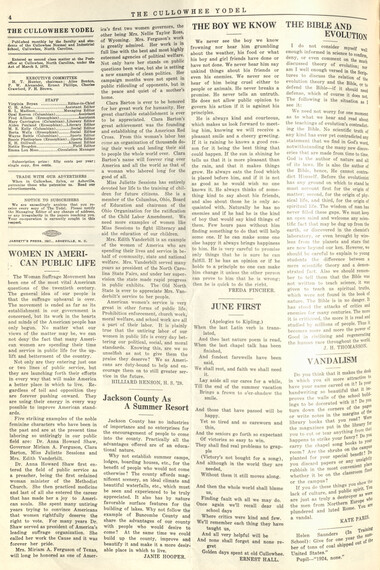

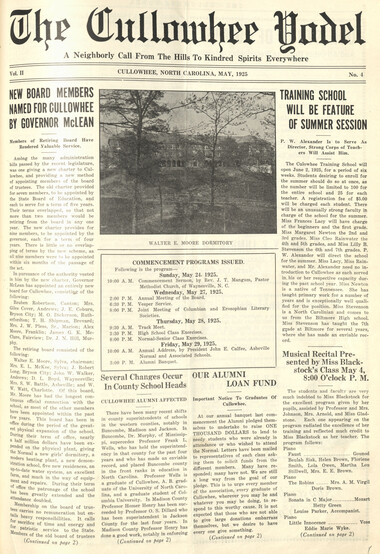
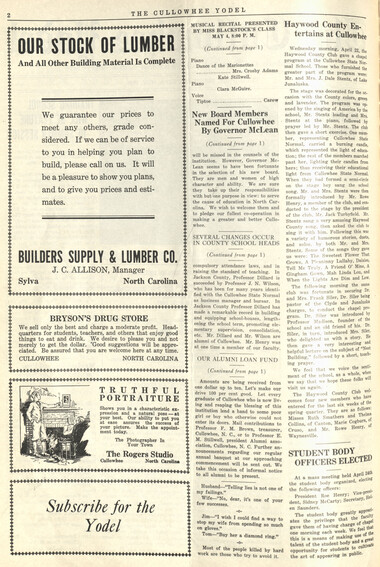
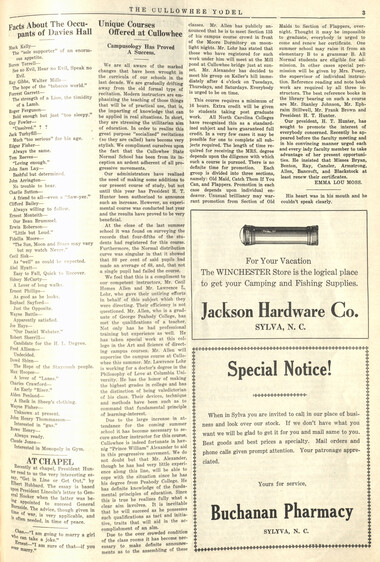
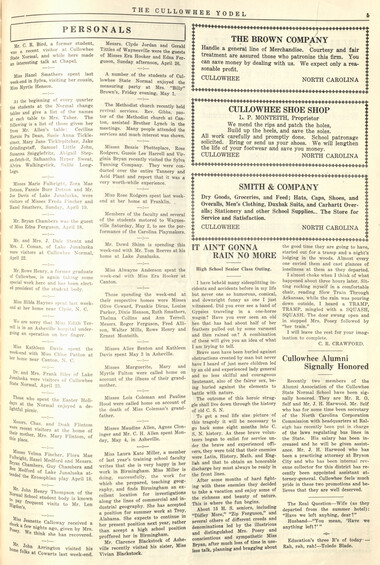
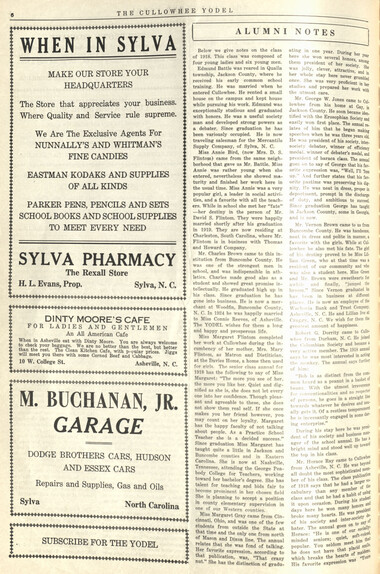
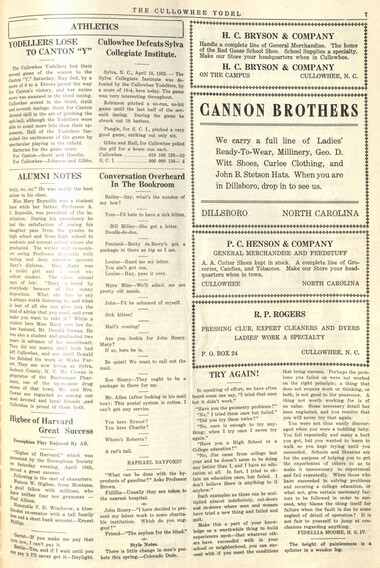
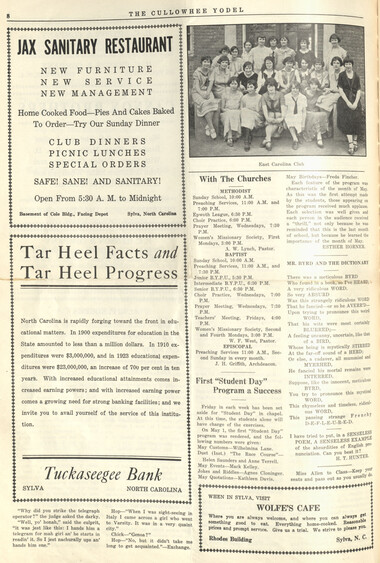
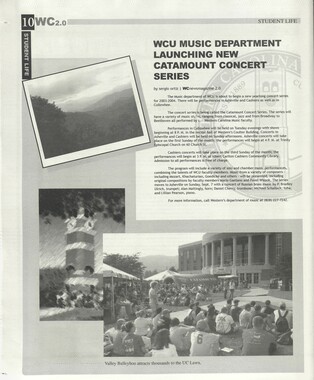
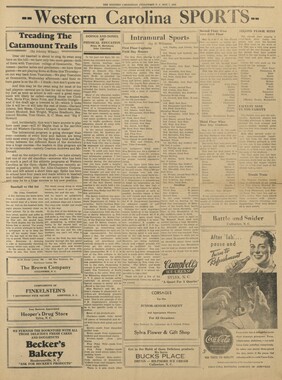
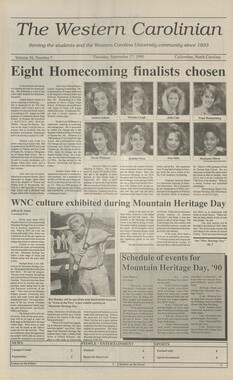
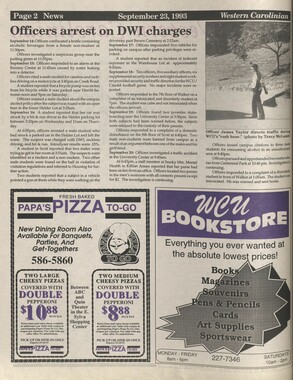
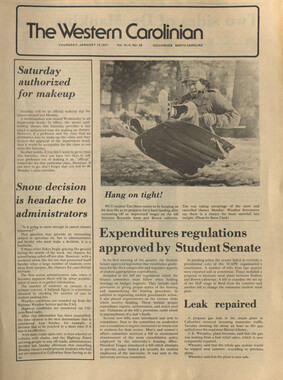
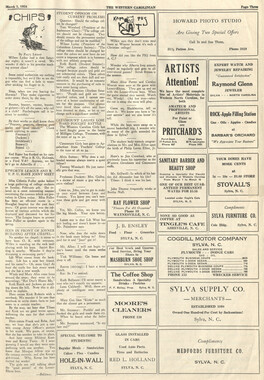
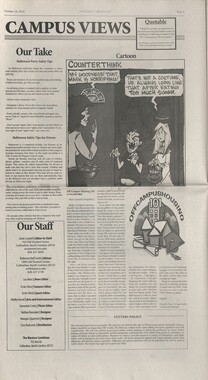
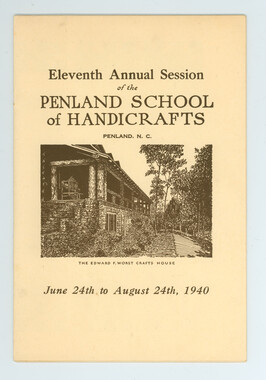
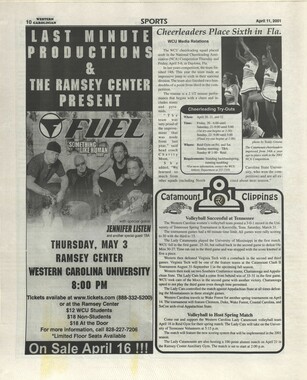
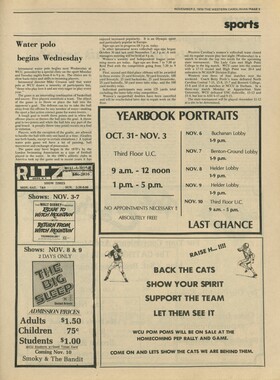
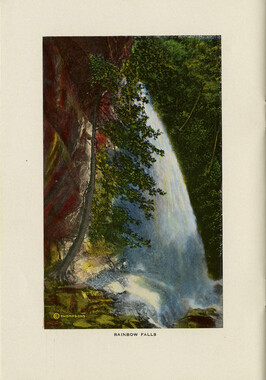
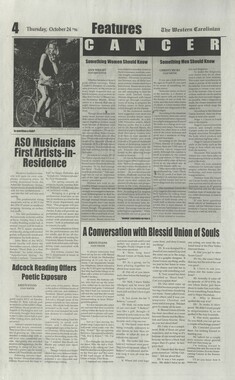
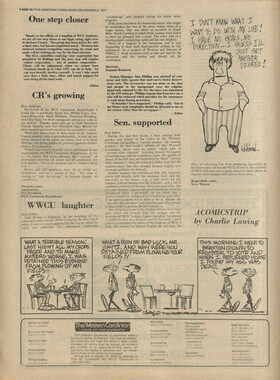
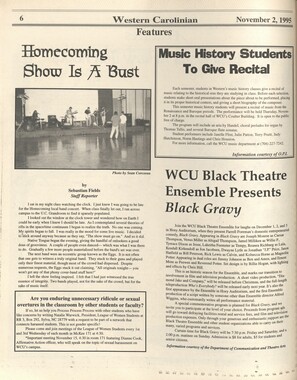
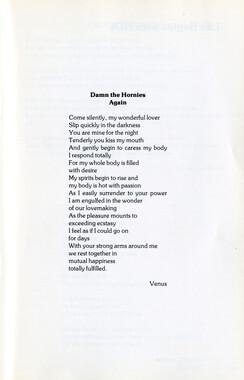
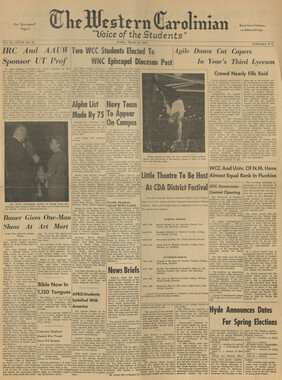
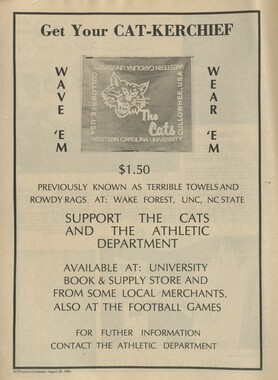
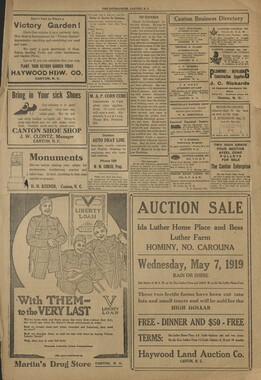
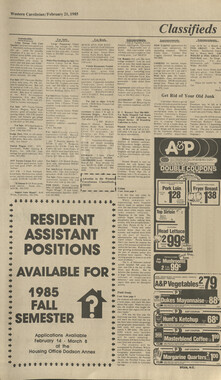
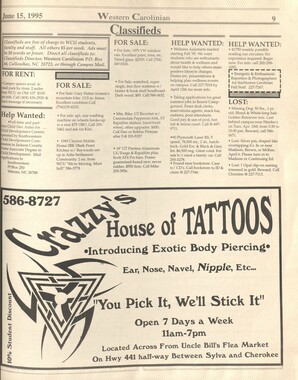

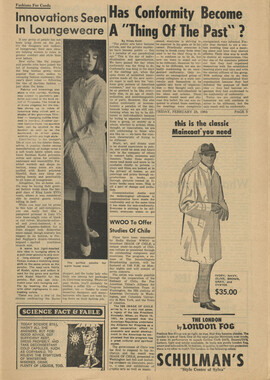
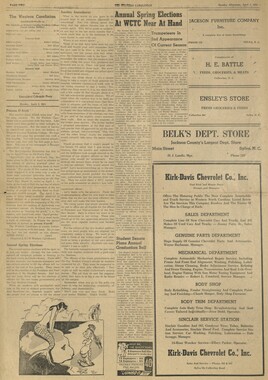
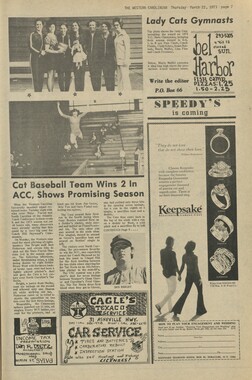
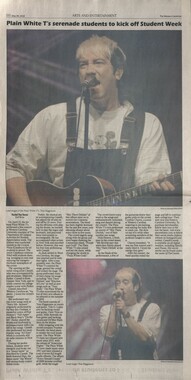
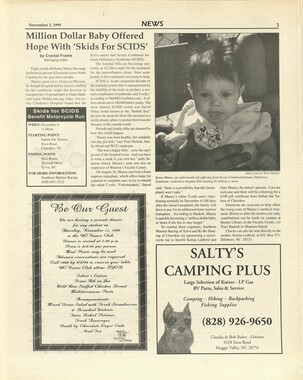
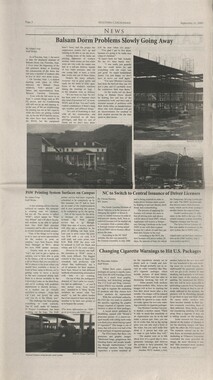
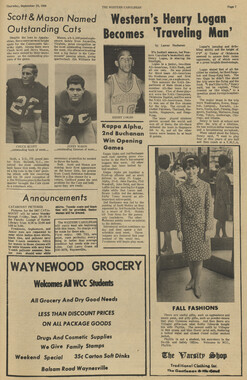
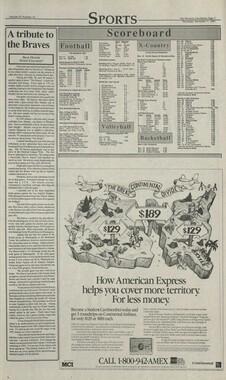
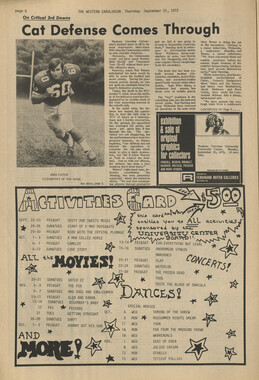
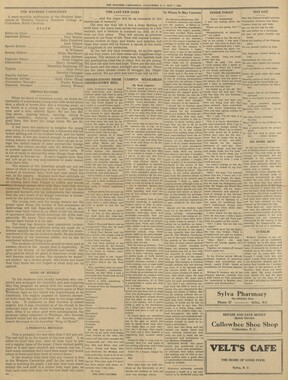
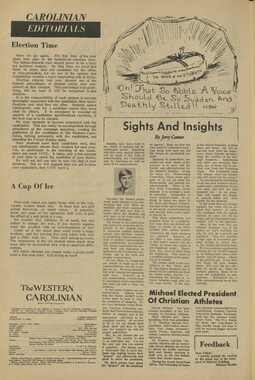

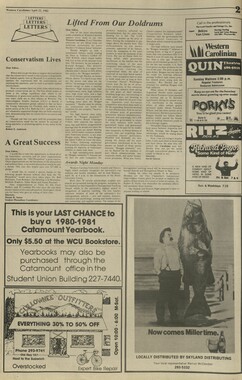

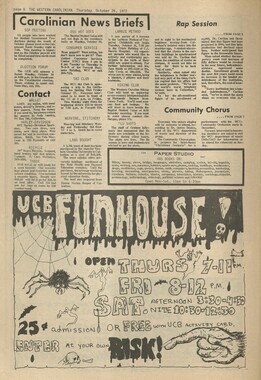
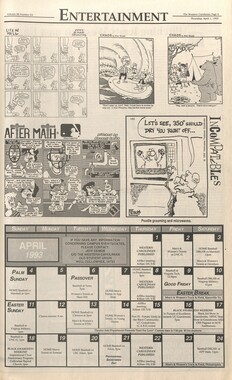
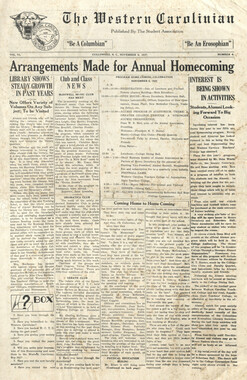
![hl_westerncarolinian_2004_[vol69_no04]_01.jpg](/media/w400h300/wcu_publications/hl_westerncarolinian_2004_[vol69_no04]_01.jpg)
